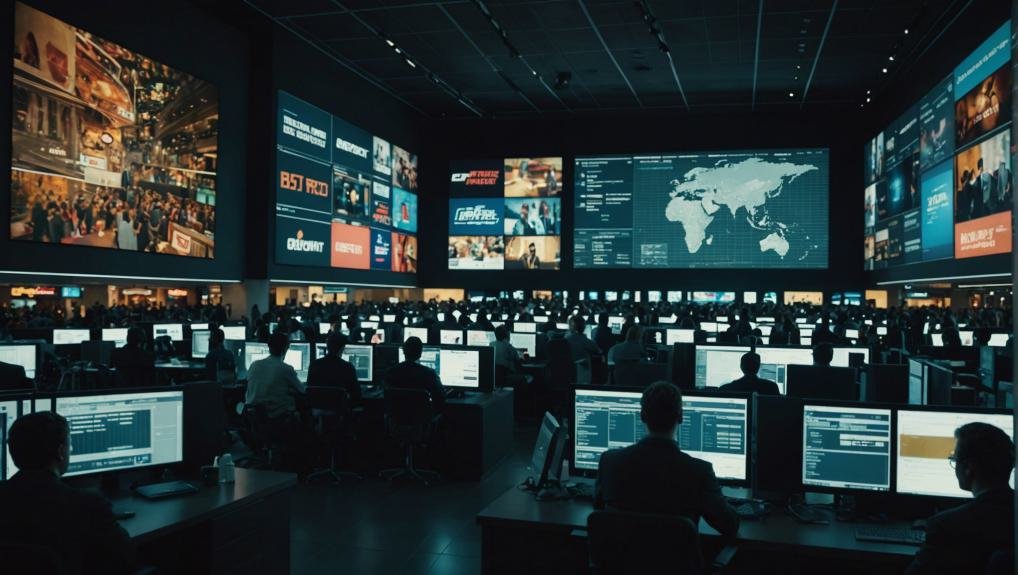AI in Real-Time Bidding for Ads
In digital advertising, AI has revolutionized real-time bidding (RTB) by enabling split-second decisions for optimized ad placements and enhanced targeting precision. With AI algorithms, personalized ad campaigns reach users efficiently based on behavior and demographics, maximizing ROI and conversion rates. Real-time data analysis and bidding optimization techniques play a vital role in ensuring ad efficiency and revenue optimization. AI's dynamic adjustments and personalized ad content generate higher engagement and revenue potential. Future trends predict AI advancements will continue to refine marketing strategies, making real-time bidding auctions more efficient and accurate. Discover more insights in AI-powered RTB for further depth.
Evolution of RTB With AI
In recent years, the integration of Artificial Intelligence (AI) has revolutionized the evolution of Real-Time Bidding (RTB) in the advertising industry. AI algorithms have played a pivotal role in enhancing RTB processes by enabling real-time optimization of ad placements and increasing ad efficiency. These algorithms analyze vast amounts of data at incredible speeds to make split-second decisions on ad placements, ensuring that the right ad is shown to the right audience at the right time.
Through AI algorithms, RTB has evolved to become more sophisticated and precise, allowing advertisers to target their audiences with higher accuracy and relevance. Real-time optimization powered by AI enables ads to be adjusted instantly based on user behavior and other contextual factors, resulting in improved campaign performance and conversion rates. This level of ad efficiency wouldn't have been achievable without the integration of AI technologies into the RTB ecosystem, marking a significant milestone in the evolution of digital advertising strategies.
Targeting Precision and AI
AI has revolutionized targeting precision in real-time bidding for ads, allowing for highly efficient personalized ad campaigns tailored to individual users.
By leveraging AI algorithms, advertisers can analyze vast amounts of user data to target the right audience with the right message at the right time.
This level of precision not only maximizes ad performance but also enhances user experience by delivering relevant content.
AI Targeting Efficiency
Enhancing the precision of targeting in real-time bidding through AI algorithms is critical for maximizing the effectiveness of ad campaigns. AI targeting accuracy plays a pivotal role in ensuring that ads reach the most relevant audience at the right moment. By leveraging AI technology, advertisers can make real-time bid adjustments based on a multitude of factors such as user behavior, demographics, and browsing history. This level of sophistication allows for more efficient allocation of ad spend, focusing on users who are more likely to engage with the content.
AI targeting efficiency not only enhances the relevance of ads but also contributes to better ROI by reducing wasted impressions on disinterested users. The ability to analyze vast amounts of data in real-time enables advertisers to adapt their targeting strategies instantly, optimizing campaign performance. By continuously refining targeting parameters through AI, advertisers can stay ahead of the competition and drive higher conversion rates.
In the dynamic landscape of real-time bidding, AI targeting efficiency is a game-changer for advertisers seeking to maximize the impact of their ad campaigns.
Personalized Ad Campaigns
Effective targeting precision in personalized ad campaigns is essential for optimizing ad performance and maximizing ROI. By leveraging behavioral targeting and user segmentation, advertisers can tailor their ads to specific audience segments, ensuring that the right message reaches the right individual at the right time.
Behavioral targeting involves analyzing user behavior to understand preferences and interests, allowing for the creation of highly relevant ad campaigns. User segmentation further refines this process by categorizing individuals based on demographics, interests, and online activity.
Dynamic ad content plays an important role in personalized ad campaigns, enabling advertisers to deliver customized ad experiences that resonate with each viewer. With dynamic content, ads can adapt in real-time based on user interactions, providing a more engaging and personalized experience. This level of customization not only enhances user engagement but also increases the likelihood of conversion.
Bidding Optimization Techniques
To enhance the efficiency of real-time bidding for ads, implementing advanced bidding optimization techniques is essential. Performance analytics play an important role in guiding these optimization strategies. By leveraging performance analytics, advertisers can gain valuable insights into the effectiveness of their bids in real-time auctions.
Understanding key metrics such as click-through rates, conversion rates, and cost per acquisition allows for data-driven decision-making in bid management. Bid management is another vital aspect of bidding optimization techniques. AI algorithms can analyze vast amounts of data to adjust bids dynamically based on factors like user behavior, ad placement, and competitor activity.
This real-time adjustment capability ensures that bids are optimized to maximize ROI and achieve campaign objectives. Through continuous monitoring and optimization, advertisers can fine-tune their bidding strategies for better performance and cost-efficiency.
AI-Powered Ad Personalization
Utilizing AI technology enables advertisers to tailor ad content dynamically based on user preferences and behavior, enhancing the personalization of ad experiences.
Ad customization is taken to a new level through machine learning algorithms that analyze vast amounts of data to understand consumer behavior patterns. By leveraging these insights, advertisers can create highly relevant ads that resonate with their target audience, increasing consumer engagement.
Machine learning plays an essential role in ad relevance by allowing advertisers to deliver personalized content in real-time. Through sophisticated algorithms, AI can predict user preferences and adjust ad elements such as copy, images, and calls-to-action accordingly.
This level of customization not only improves the user experience but also increases the likelihood of conversions.
Real-Time Data Analysis
An essential component of AI-powered real-time bidding for ads is the capability for rapid and precise real-time data analysis. Real-time analytics, powered by machine learning algorithms, enables advertisers to gather and process vast amounts of data instantaneously. This real-time analysis provides valuable insights into consumer behavior, allowing for dynamic adjustments to ad campaigns based on the most up-to-date information.
By harnessing machine learning capabilities, advertisers can automate the optimization of their ad bidding strategies. This automation guarantees that ads are shown to the most relevant audience at the right time, maximizing the chances of conversion.
Data-driven insights derived from real-time analysis help advertisers understand which ad creatives, targeting parameters, and bidding strategies are most effective, leading to more efficient ad spend and higher ROI.
Enhancing Ad Performance
Rapid and precise real-time data analysis in AI-powered real-time bidding for ads establishes the foundation for enhancing ad performance through targeted optimization strategies. Ad performance tracking plays a pivotal role in this process, enabling AI algorithms to continuously monitor and assess the effectiveness of ad campaigns.
By analyzing key metrics such as click-through rates, conversions, and engagement levels, AI can identify trends and patterns that indicate which ads are resonating with your target audience.
AI-driven ad optimization takes this concept further by dynamically adjusting bidding strategies, ad creatives, and targeting parameters in real-time based on the insights gathered from ad performance tracking. This proactive approach guarantees that your ad campaigns are constantly refined and optimized for maximum impact.
Through machine learning algorithms, AI can predict which ad variations are likely to yield the best results and automatically allocate resources to those that are most likely to drive conversions.
AI's Role in Ad Efficiency
How does AI revolutionize ad efficiency in real-time bidding processes?
AI plays a pivotal role in enhancing ad efficiency through various mechanisms. One significant aspect is AI ad creativity, where algorithms analyze vast amounts of data to generate compelling and personalized ad content in real-time.
By utilizing AI algorithms, advertisers can optimize their ad campaigns based on real-time analytics, guaranteeing that the right ad is shown to the right audience at the right time. This level of ad optimization is unparalleled in traditional advertising methods, allowing for increased efficiency and effectiveness in reaching target audiences.
Moreover, AI algorithms can continuously monitor and adjust ad campaigns, making split-second decisions to maximize performance. This dynamic approach to ad efficiency ensures that resources are allocated effectively, leading to higher conversion rates and improved ROI.
AI Impact on Ad Revenue
AI's impact on ad revenue is profound, as it enables precise revenue optimization through data-driven decision-making. By leveraging AI algorithms, targeted ad campaigns can be tailored to specific audiences, increasing the likelihood of conversions.
Real-time bidding strategies powered by AI further enhance revenue potential by optimizing ad placements for maximum impact.
Revenue Optimization With AI
Optimizing ad revenue through the implementation of AI technologies has become a fundamental strategy for real-time bidding in the digital advertising landscape. By leveraging AI-driven bidding and predictive analytics, businesses can enhance their ad revenue forecasting and ultimately maximize revenue.
AI algorithms analyze vast amounts of data in real-time to predict the likelihood of a user engaging with a specific ad, enabling advertisers to bid more effectively on ad placements. This data-driven approach allows for more precise targeting, ensuring that ads are shown to the most relevant audiences, increasing the chances of conversion and revenue generation.
Moreover, AI can optimize bidding strategies by adjusting bids dynamically based on factors such as user behavior, demographics, and contextual relevance. This dynamic optimization process helps in achieving revenue maximization by allocating budgets to the most promising ad opportunities.
In essence, the integration of AI into real-time bidding not only streamlines the ad buying process but also significantly improves ad revenue outcomes through enhanced targeting and efficient bidding strategies.
Targeted Ad Campaigns
Utilizing artificial intelligence in targeted ad campaigns revolutionizes the landscape of ad revenue generation by enabling precise audience segmentation and tailored messaging strategies. By leveraging AI algorithms to analyze vast amounts of data on consumer behavior, ad targeting becomes highly important. Understanding consumer preferences, demographics, and online activities allows for the creation of hyper-targeted ads that are more likely to resonate with specific audience segments.
AI algorithms play a vital role in enhancing ad relevance by dynamically adjusting ad content in real-time based on user interactions and feedback. This level of personalization leads to increased engagement and conversion rates, ultimately boosting ad revenue. Machine learning models can predict consumer behavior patterns, helping advertisers anticipate the needs and preferences of their target audience.
Furthermore, AI enables continuous optimization of ad campaigns by analyzing performance metrics and adjusting targeting parameters accordingly. This iterative process ensures that ad content remains relevant and impactful, maximizing the return on investment for advertisers.
Essentially, AI empowers targeted ad campaigns to deliver more personalized and effective messaging, driving higher ad revenue through improved engagement and conversion rates.
Real-Time Bidding Strategies
Real-time bidding strategies in digital advertising have been greatly transformed by the integration of artificial intelligence, enhancing ad revenue generation through dynamic and data-driven auction processes. AI bidding strategies provide advertisers with a significant competitive advantage by enabling them to make split-second decisions based on real-time data and user behavior analysis.
These AI-driven algorithms optimize bids for each impression, ensuring that advertisers reach their target audience effectively while maximizing ROI.
Real-time bidding algorithms powered by AI continuously learn and adapt to changing market conditions, adjusting bidding strategies accordingly to improve performance metrics such as click-through rates, conversion rates, and overall campaign success.
Future Trends in AI and RTB
Considering the rapid advancements in artificial intelligence technology, the domain of real-time bidding for ads is poised to undergo significant transformations in the coming years. AI advancements are expected to revolutionize marketing strategies by enabling more precise targeting, personalized messaging, and improved ROI measurement. As AI continues to evolve, it will enhance the efficiency and effectiveness of real-time bidding auctions, allowing advertisers to reach their target audiences with greater accuracy and relevance.
In the sphere of RTB innovation, advertising technology is likely to become more sophisticated, incorporating AI algorithms that can analyze vast amounts of data in real-time to make split-second bidding decisions. These advancements won't only streamline the ad buying process but also optimize campaign performance by delivering the right ad to the right user at the right time.
Conclusion
As AI continues to revolutionize real-time bidding for ads, the future looks promising for advertisers seeking to maximize their ROI. By leveraging AI-powered targeting precision, bidding optimization techniques, and personalized ad content, brands can effectively reach their target audience and drive higher conversion rates.
The integration of AI in real-time data analysis not only enhances ad performance but also boosts ad efficiency and revenue. The future trends in AI and RTB point towards a more data-driven and personalized advertising landscape.







